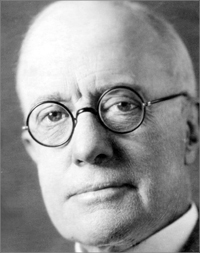Theodore Lyman
Theodore Lyman

AIP Emilio Segrè Visual Archives, Physics Today Collection
OSA Honorary Member Theodore Lyman graduated from Harvard in 1897, and completed a Ph.D. there in 1900. Except for two years at the Cavendish Laboratory, he remained at Harvard for the duration of his career. He resigned as professor and chair of physics in 1926, but continued as director of the Jefferson Laboratory for 20 more years.
Lyman was a pioneer in studying the extreme ultraviolet range of the spectrum. Theodor Schumann in Leipzig had extended spectroscopy to about 200 nm by using a fluoride prism; Lyman substituted instead a concave grating in a vacuum spectrometer. In 1906, Lyman studied the molecular spectrum of hydrogen. In 1914, he discovered the ultraviolet atomic series of hydrogen that had been predicted by Ritz from Balmer’s visible series. When World War I broke out, Lyman left his research and served in the U.S. Signal Corps in France where he studied flash and sound ranging.
After the war, Lyman felt he never regained his original enthusiasm for his research. He took on additional administrative responsibilities and was stymied by ill health. He did manage to investigate the principal series of helium (including the Lyman alpha line used by astronomers to study the sun). By 1940, he had reached 10 nm, nearly closing the gap between ultraviolet and X-rays.
For his dedication to spectroscopy and physics in general, he received numerous honors. Upon his retirement in 1947, a new physics facility was named the Lyman Laboratory of Physics. Lyman received the Rumford Medal of the American Academy of Arts and Sciences, the Elliott Cresson Medal of the American Philosophical Society, and OSA’s Frederic Ives Medal.
He was a member of the National Academy of Sciences and the American Philosophical Society. In addition, he was a Fellow of the American Physical Society, serving as president from 1921-1922, a Fellow of the American Academy of Arts and Sciences, serving as president from1924 to 1927, and a Fellow of the Royal Geographical Society. He was an honorary member of the Royal Institution of Great Britain and OSA.
Theodore Lyman died in 11 October 1954.
Document Created: 26 July 2023
Last Updated: 28 August 2023
